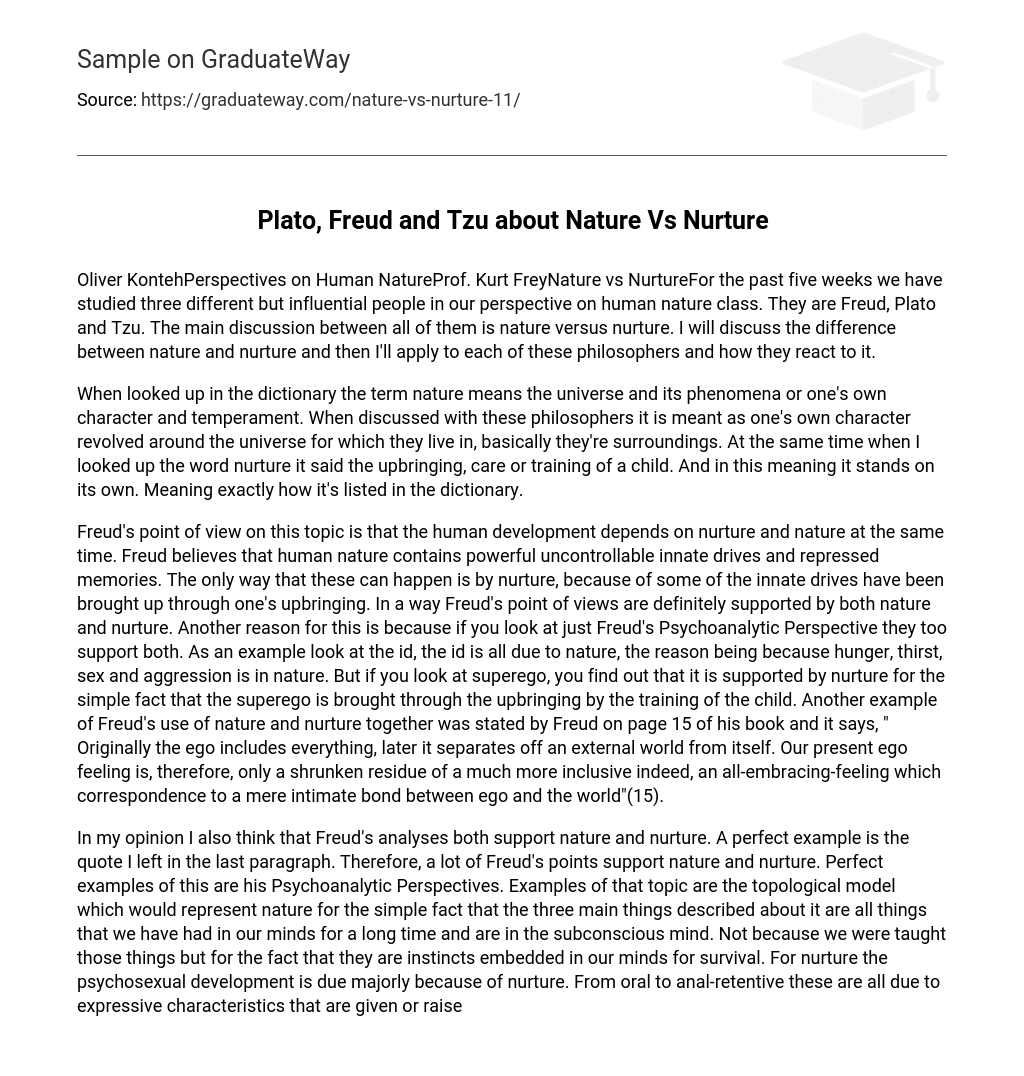Over the past five weeks, our human nature class has focused on three significant figures: Freud, Plato, and Tzu. These philosophers have all explored the concept of nature versus nurture. In the following analysis, I will examine and compare their distinct perspectives on differentiating between nature and nurture.
According to the dictionary, “nature” encompasses both the universe and its phenomena, as well as an individual’s character and temperament. When philosophers discuss nature, they consider how an individual’s character relates to the surrounding universe. In contrast, “nurture” is solely defined as the upbringing, care, or training of a child.
According to Freud, human development is influenced by both nurture and nature. He asserts that human nature consists of strong innate drives and repressed memories. These drives and memories can only manifest through nurturing, as they are shaped by one’s upbringing.
Freud’s perspective is supported by both nature and nurture. This is evident in his Psychoanalytic Perspective, where both these factors play a significant role. The id, for instance, is driven by natural instincts such as hunger, thirst, sex, and aggression. On the other hand, the superego is shaped by nurture through the upbringing and training of the child.
Freud extensively incorporates both nature and nurture in his work. On page 15 of his book, he discusses the ego’s development, stating that initially it encompasses everything and later distinguishes an external world from itself. Presently, our ego feeling is merely a diminished remnant of a far more comprehensive, all-encompassing feeling, which signifies an intimate connection between the ego and the world (15).
In my view, Freud’s analyses support the idea of both nature and nurture. This is shown by the quote mentioned earlier. Therefore, many of Freud’s ideas emphasize the significance of both nature and nurture. His Psychoanalytic Perspectives provide excellent examples of this concept. For instance, the topological model can be interpreted as representing nature because it discusses three innate instincts in our subconscious minds that have been present for a long time and are essential for survival.
The psychosexual development is mainly affected by nurture, which includes a person’s innate or acquired expressive characteristics. The structural model has the greatest influence in this aspect. The id represents the primal part of the mind driven by natural instincts. Likewise, the ego also develops as a result of these instincts, particularly the reality principle. Freud even suggests that adult ego-feeling must have gone through a developmental process, stating “adults ego-feeling can’t have been the same from beginning. It must have undergone a process of development” (13).
The superego, a significant element of psychoanalytic theory, experiences change as it symbolizes nurturing and develops when children internalize their parents’ values and discipline approaches.
Plato’s viewpoint emphasizes nurture over nature, as he believes that women should be assigned less physically demanding tasks. While the concept of female guards could suggest a preference for nature, it is mainly based on Plato’s argument that historically women have been given less strenuous work compared to men. This perception is influenced by both nature and nurture, shaping the belief that women are incapable of handling the same workload as men.
I have chosen nurture as my preferred approach because Plato emphasizes the importance of well-organized societies in his book. He argues that such societies can only be achieved through nurture, rather than nature. This is because every position within these societies requires careful consideration and training from childhood to adulthood in order to ensure their proper functioning.
Plato was more challenging to discuss because he focused extensively on society. After reading Plato, I concluded that he emphasizes nurture over nature. This is because throughout history, societies have been developed through significant influence from a group of individuals. In contrast, nature would result in people living together without any structure or authority that comes with a chosen process. Finally, I will address Chuang Tzu.
In essence, Chuang Tzu asserts his unwavering support for nature over nurture throughout the book. He explicitly states that “Nurture keeps you out of touch with your true self” (Healey). While addressing various profound topics, Chuang Tzu consistently emphasizes his preference for nature over nurture. As he puts it, “Those who go quietly with the flow of nature are not worried by either joy or sorrow.”
People like these were considered as having achieved freedom from bondage, while those who cannot free themselves are constrained by things” (53). Chuang Tzu made many comments like this, such as “if you are prepared to accept this and flow with it, then sorrow and joy cannot touch you” (24) and “The best thing to do is leave it all to fate, even if this is not easy to do” (32).
While reading Chuang Tzu, I realized that his words required no further explanations. However, his perspective on life holds profound significance for me. His remarkable and logical view on nature, combined with the right nurturing influence, can enable humanity to cultivate a proper spiritual and psychological mindset. This understanding is crucial to comprehend the function of nature as the sole driving force. In essence, I perceive nurture as a means to attain the utopia that Mother Nature offers. My reasoning stems from the belief that without the knowledge imparted through nurturing, mankind would be at a loss in managing the freedom bestowed by nature.
After reading books by Plato, Freud, and Tzu on the concept of nature versus nurture, I found it incredibly fascinating. It made me contemplate what life would be like if we solely relied on nature. However, I also realized that the reason behind these ponderings and the understanding of how it would actually work is all due to nurture. Through nurture, I have had the opportunity to think logically and grow as an individual.





